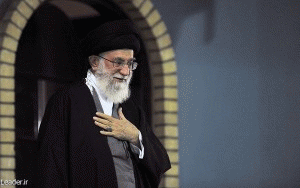From Consortium News

ran's Supreme Leader Ali Khamenei visiting the holy city of Qom in January 2013.
(Image by (Iranian government photo)) Details DMCA
For many years, major U.S. institutions ranging from the Pentagon to the 9/11 Commission have been pushing the line that Iran secretly cooperated with Al Qaeda both before and after the 9/11 terror attacks. But the evidence for those claims remained either secret or sketchy, and always highly questionable.
In early November, however, the mainstream media claimed to have its "smoking gun" -- a CIA document written by an unidentified Al Qaeda official and released in conjunction with 47,000 never-before-seen documents seized from Osama bin Laden's house in Abbottabad, Pakistan.
The Associated Press reported that the Al Qaeda document "appears to bolster U.S. claims that Iran supported the extremist network leading up to the September 11 terror attacks." The Wall Street Journal said the document "provides new insights into Al Qaeda's relationship with Iran, suggesting a pragmatic alliance that emerged out of shared hatred of the United States and Saudi Arabia."
NBC News wrote that the document reveals that, "at various points in the relationship ... Iran offered Al Qaeda help in the form of 'money, arms' and 'training in Hezbollah camps in Lebanon in exchange for striking American interests in the Gulf,'" implying that Al Qaeda had declined the offer.
Former Obama National Security Council spokesman Ned Price, writing for The Atlantic, went even further, asserting that the document includes an account of "a deal with Iranian authorities to host and train Saudi-Al Qaeda members as long as they have agreed to plot against their common enemy, American interests in the Gulf region."
But none of those media reports were based on any careful reading of the document's contents. The 19-page Arabic-language document, which was translated in full for The American Conservative, doesn't support the media narrative of new evidence of Iran-Al Qaeda cooperation, either before or after 9/11, at all.
It provides no evidence whatsoever of tangible Iranian assistance to Al Qaeda. On the contrary, it confirms previous evidence that Iranian authorities quickly rounded up those Al Qaeda operatives living in the country when they were able to track them down, and held them in isolation to prevent any further contact with Al Qaeda units outside Iran.
Taken by Surprise
What it shows is that the Al Qaeda operatives were led to believe Iran was friendly to their cause and were quite taken by surprise when their people were arrested in two waves in late 2002. It suggests that Iran had played them, gaining the fighters' trust while maximizing intelligence regarding Al Qaeda's presence in Iran.
Nevertheless, this account, which appears to have been written by a mid-level Al Qaeda cadre in 2007, appears to bolster an internal Al Qaeda narrative that the terror group rejected Iranian blandishments and were wary of what they saw as untrustworthiness on the part of the Iranians. The author asserts the Iranians offered Saudi Al Qaeda members who had entered the country "money and arms, anything they need, and training with Hezbollah in exchange for hitting American interests in Saudi Arabia and the Gulf."
But there is no word about whether any Iranian arms or money were ever actually given to Al Qaeda fighters. And the author acknowledges that the Saudis in question were among those who had been deported during sweeping arrests, casting doubt over whether there was ever any deal in the offing.
The author suggests Al Qaeda rejected Iranian assistance on principle. "We don't need them," he insisted. "Thanks to God, we can do without them, and nothing can come from them but evil."
That theme is obviously important to maintaining organizational identity and morale. But later in the document, the author expresses deep bitterness about what they obviously felt was Iranian double-dealing in 2002 to 2003.
"They are ready to play-act," he writes of the Iranians. "Their religion is lies and keeping quiet. And usually they show what is contrary to what is in their mind ... It is hereditary with them, deep in their character."
(Note: You can view every article as one long page if you sign up as an Advocate Member, or higher).





